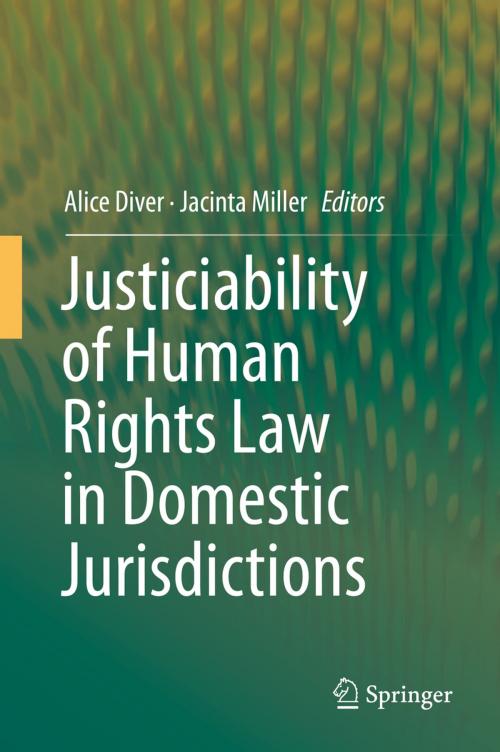Justiciability of Human Rights Law in Domestic Jurisdictions
Nonfiction, Reference & Language, Law, International, Social & Cultural Studies, Political Science, Government, Social Policy| Author: | ISBN: | 9783319240169 | |
| Publisher: | Springer International Publishing | Publication: | December 15, 2015 |
| Imprint: | Springer | Language: | English |
| Author: | |
| ISBN: | 9783319240169 |
| Publisher: | Springer International Publishing |
| Publication: | December 15, 2015 |
| Imprint: | Springer |
| Language: | English |
This collection of 16 essays by 19 contributors calls into question the notion of domestic justiciability across a wide range of human rights issues, such as health, human dignity, criminal justice, property and transitional democracy. The authors offer critical analyses of a number of rights frameworks, focusing in considerable detail upon specific countries (e.g. Libya, Colombia, Ireland, the United Kingdom, Northern Ireland, South Africa, Nigeria, Zimbabwe, Kenya, India) and regions (e.g. Europe, Africa) to highlight the various challenges which continue to vex human rights advocates and scholars. In doing so they pinpoint some of the major tensions that still exist within developing and developed jurisdictions, via a myriad range of perspectives. The essays collectively present a diverse assortment of themes unified by a single ‘golden thread’ – that of the domestic interpretations given to human rights protections. They raise questions as to how such rights might be made substantive at the level of domestic implementation, and query the extent to which these rights can, or even should, be enforced by the courts. The potential strains in the relationship between human rights and the rule of law, is further called into question by another central theme: that of human dignity. A fundamental dilemma arises in respect of the extent to which a ‘right’ to dignity can best be promoted, protected or monitored by domestic decision-makers. Similar issues are apparent within the context of the protection of those human rights which increasingly tend to engage social, political or economic considerations and interests. Whilst these arguments are often framed principally in terms of ‘rights,’ the collective message that emerges from this book is that such rights may often be, in fact, essentially non-justiciable. Readers of this text will perhaps feel compelled to reflect carefully and fully upon what it tells us about human rights law generally, and the extent to which such rights may be truly amenable to adjudication by the courts.
This collection of 16 essays by 19 contributors calls into question the notion of domestic justiciability across a wide range of human rights issues, such as health, human dignity, criminal justice, property and transitional democracy. The authors offer critical analyses of a number of rights frameworks, focusing in considerable detail upon specific countries (e.g. Libya, Colombia, Ireland, the United Kingdom, Northern Ireland, South Africa, Nigeria, Zimbabwe, Kenya, India) and regions (e.g. Europe, Africa) to highlight the various challenges which continue to vex human rights advocates and scholars. In doing so they pinpoint some of the major tensions that still exist within developing and developed jurisdictions, via a myriad range of perspectives. The essays collectively present a diverse assortment of themes unified by a single ‘golden thread’ – that of the domestic interpretations given to human rights protections. They raise questions as to how such rights might be made substantive at the level of domestic implementation, and query the extent to which these rights can, or even should, be enforced by the courts. The potential strains in the relationship between human rights and the rule of law, is further called into question by another central theme: that of human dignity. A fundamental dilemma arises in respect of the extent to which a ‘right’ to dignity can best be promoted, protected or monitored by domestic decision-makers. Similar issues are apparent within the context of the protection of those human rights which increasingly tend to engage social, political or economic considerations and interests. Whilst these arguments are often framed principally in terms of ‘rights,’ the collective message that emerges from this book is that such rights may often be, in fact, essentially non-justiciable. Readers of this text will perhaps feel compelled to reflect carefully and fully upon what it tells us about human rights law generally, and the extent to which such rights may be truly amenable to adjudication by the courts.















